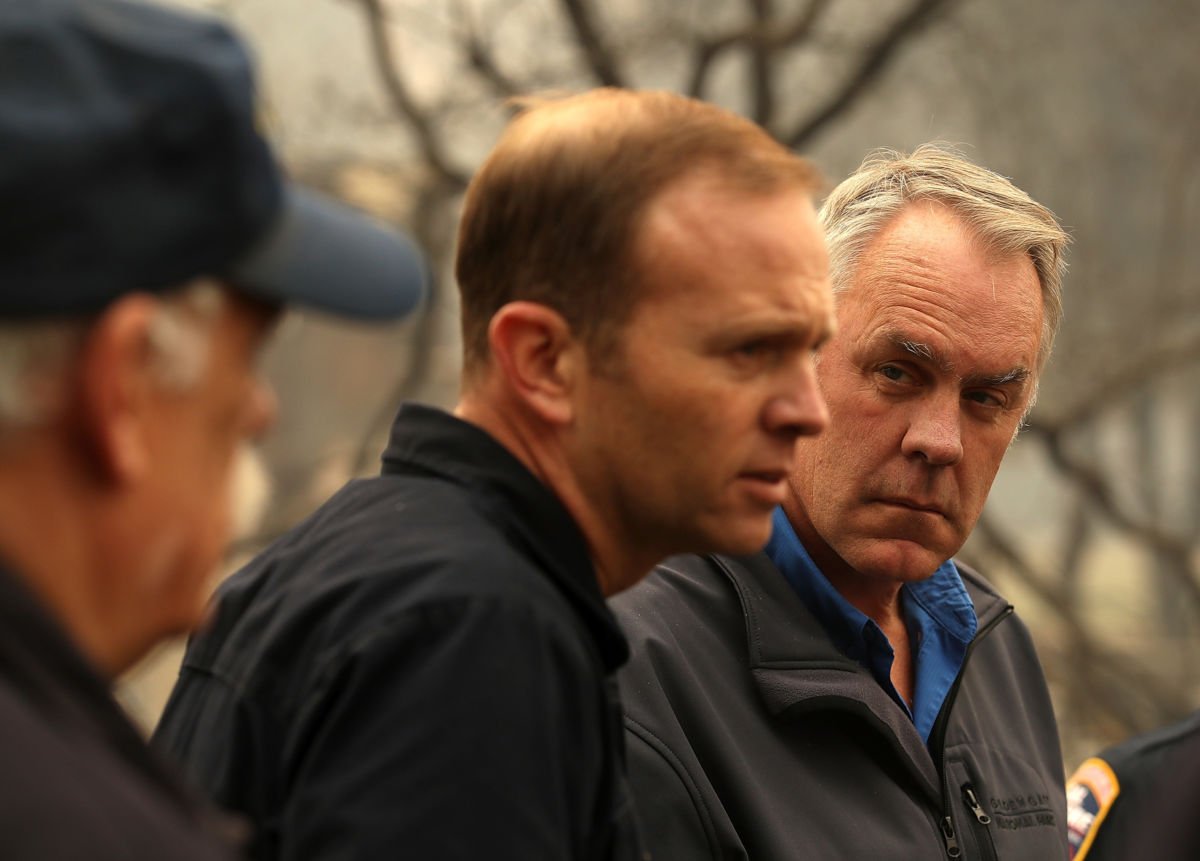Did you know that Truthout is a nonprofit and independently funded by readers like you? If you value what we do, please support our work with a donation.
Interior Secretary Ryan Zinke, already facing several federal investigations, has sunk to a new low.
A prominent figure in Trump’s plan to roll back environmental regulations, he’s using deadly fires in California to push for policies that would pave the way for more logging in U.S. forests.
But here’s the truth: Logged areas with less stringent environmental protections lead to the most intense and dangerous fires.
The Camp Fire, the deadliest in California history left:
- 88 people dead
- 25 people still missing
- 240 square miles burned
- 13,972 homes destroyed
- 528 commercial structures destroyed
- 4,293 other buildings destroyed
When Trump visited the charred remains of Paradise, the center of the fire, he couldn’t even get the name of the town correct, calling it “Pleasure.” And now Zinke is using this horrific disaster to push for increased logging.
Greg Aplet, science director for the Wilderness Society in Denver, explained Zinke’s sneaky and manipulative approach:
We’ve seen it every time the woods catch on fire. Politicians use the genuine fear of fire to try to drive changes that undermine environmental laws.
Aplet agrees with many wildfire behavior scientists, who believes that protecting communities from fire should involve clearing out dried-out fuels from the forest floor — not live trees.
But here’s the problem for the Trump administration: “The kind of work that needs to be done is work that is not going to provide a lot of logs to the timber industry,” Aplet explains. Clearing out debris is not a money-maker.
Forest ecologist Chad Hanson was part of a 2016 study revealing that logged areas with reduced environmental protections actually have the most intense fires.
“They are trying to use this tragedy to help logging interests, which is one of the most disgusting things things I’ve seen in my career,” says Hanson. “They are trying to eliminate half a century of environmental protections and turn over forests to the logging industry.”
Center for Biological Diversity public lands director Randi Spivak weighs in:
Their so-called solutions could actually worsen wildfire risk. It’s misleading and dangerous to give people a false sense of security that they can log their way out of this, especially in the face of climate change.
The Trump administration is denying any link between climate change and wildfires — even though the major federal government climate report released last week warned that, thanks to rising temperatures, the western U.S. could experience a sixfold increase in wildfires by 2050.
Trump’s response? “I don’t believe it” — even though the report was authored by his own government.
As a resident of California, I am scared.
But what’s especially terrifying here is the Farm Bill, which the House and Senate could finally come to an agreement on, following months of debate to fund $867 billion in food and agriculture programs.
A particularly unsettling provision within the Farm Bill would limit public review and bypass any environmental analysis of forest projects on federal public land. This is currently a sticking point, but Zinke is advocating for a Farm Bill which includes this amendment.
In other words, Zinke and his buddies could just make up the rules on forest management.
A terrifying moment. We appeal for your support.
In the last weeks, we have witnessed an authoritarian assault on communities in Minnesota and across the nation.
The need for truthful, grassroots reporting is urgent at this cataclysmic historical moment. Yet, Trump-aligned billionaires and other allies have taken over many legacy media outlets — the culmination of a decades-long campaign to place control of the narrative into the hands of the political right.
We refuse to let Trump’s blatant propaganda machine go unchecked. Untethered to corporate ownership or advertisers, Truthout remains fearless in our reporting and our determination to use journalism as a tool for justice.
But we need your help just to fund our basic expenses. Over 80 percent of Truthout’s funding comes from small individual donations from our community of readers, and over a third of our total budget is supported by recurring monthly donors.
Truthout has launched a fundraiser to add 500 new monthly donors in the next 9 days. Whether you can make a small monthly donation or a larger one-time gift, Truthout only works with your support.
